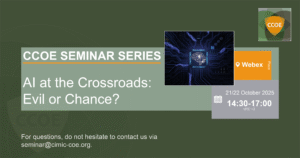
AI at the Crossroad: Evil or Chance? (21/22 OCT 2025)
Artificial Intelligence (AI) is no longer a futuristic concept – it’s a rapidly evolving reality shaping every aspect of society, from everyday life to the
Home » News

Artificial Intelligence (AI) is no longer a futuristic concept – it’s a rapidly evolving reality shaping every aspect of society, from everyday life to the

In today’s complex and rapidly evolving security environment, nations, societies, institutions, and individuals are confronted with an array of new threats that demand more than

A Crucial Step Towards Stronger Civil-Military Cooperation In an era of increasing geopolitical complexity, effective Civil-Military Cooperation (CIMIC) has never been more critical. Whether in

In today’s complex and fast-evolving operational landscape, wargaming has emerged as an essential tool for strategic planning. This immersive approach empowers participants to explore diverse

Is the current state of CIMIC (Civil-Military Cooperation) a recipe for disaster or a beacon of hope in the face of crisis? As we look

In today’s world, where challenges seem to multiply with each passing day, the need for individual resilience and resilient leadership has never been more critical.

Two years after Russia launched a full-scale war against Ukraine, the conflict continues to cause extreme civilian harm and military casualties, affecting the lives of

The CCOE hosted the co-located Annual Discipline Conference for three Disciplines at the CCOE in The Hague from 04-06 June 2024. The three disciplines executing

The story of Israel and Palestine is a tale of two, bound by history and divided by ideology, where every step forward seems to be

During 04-07 September 2023 SHAPE J9 and the multinational-sponsored and NATO-accredited CIVIL MILITARY COOPERATION (CIMIC) Centre of Excellence (CCOE) hosted the INTEGRATED CIMIC KEY LEADER